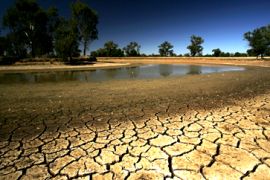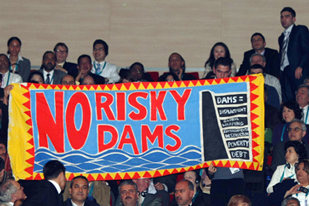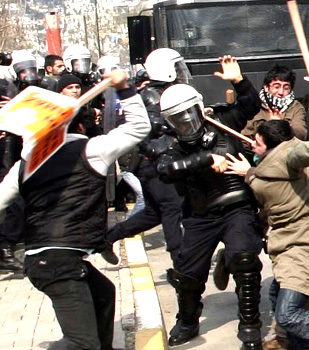World Water Forum diary
Protests and privatisation at the water scarcity conference in Istanbul.

Anita McNaught, Al Jazeera’s reporter in Istanbul, will be filing daily dispatches from the World Water Forum held in Istanbul from Monday, March 16 to Friday, March 20.
| 14:00 GMT, Wednesday, March 18, 2009: The privatisation debate |
 |
| Protestors have said the water crisis is mostly about a failure to properly invest [AFP] |
PollyAnna would not last long around here.
At the World Water Forum the contest is over who has the biggest crisis, and the end of the world is, if not nigh, most certainly dry.
Instead, we find Peter, policy director of environmental and human rights organisation International Rivers, gamely handing out press releases.
His group acquired heroic notoriety here for having the first two delegates deported for peacefully unfurling a medium-sized hand-painted cloth protest banner in the auditorium at the official opening.
“Ahhh”, I observe, scanning the release. “There’s a few of you left.”
“Only me. I’m the last man standing,” Peter explains, with a nervous smile. He is a slight, bookish, bespectacled type, looking every inch the PhD printed on his card.
| In video |
|
|
What we had discovered, in the wake of the speedy deportations of his two colleagues, was that there is an act in Turkish legislation – the Turkish Meetings Law – which states quite clearly that any foreigner engaged in unauthorised protest action is liable to immediate deportation.
The two unfurlers of International Rivers were charged with “trying to influence public opinion”. They were given two choices: immediate removal or charges laid with a possible sentence of more than one year in jail. They left.
All of this is, of course, a gratuitous distraction from the important matters at hand. Like the End of the World. But more on that in tomorrow’s diary.
It had been niggling at me for some time, that somewhere in the crowd of 20,000 experts, scientists, philosophers, researchers, policymakers, company directors, campaigners and unfurlers at the forum, there must be someone, somewhere who could tell me whether it has been conclusively established, one way or another, if the “business model” worked in water management.
Business getting ‘a bad rap’?
Business, after all, gets a bad rap these days. It would be unfair to blame untrammelled, unregulated, under-inspected runaway capitalism for the entire global financial meltdown, surely?
Then I come across a biography in a conference-related email, make a call to the University of Greenwich, England, and managed to summon up the sort of person most beloved of journalists: Someone Who Has Done the Research and Has the Answer.
Here also, I find the closest I’m going to get to PollyAnna.
|
“Investigations by the World Bank, us and others have shown that the private sector, when involved in utilities like water, failed to deliver any significant capital investment” David Hall |
David Hall is a trained engineer, turned academic. His papers on the private sector and the water industry, private-public partnerships, public finance and public-public partnerships are all about what has worked, and what has not, and why.
And he is the first person I have met for a while, who is happy about the global financial crisis.
“It’s a terrific opportunity”, he explains to me, eyes twinkling under thick specs. “Public spending is no longer a problem, but a solution.”
Stimulus packages get spent on infrastructure, he explains. The only time most governments have spent serious money on essential services is when they have needed to keep the workforce busy.
And for him, the global water crisis is mostly about a failure to make proper investments; in pipes, sewers catchment and storage.
There are only two main things the world’s water delivery system really needs to dramatically improve access for all, David Hall continues.
“The first is finance for decent infrastructure, the second is institutions capable of providing transparent, honest and efficient provision of water.
“Investigations by the World Bank, us and others have shown that the private sector, when involved in utilities like water, failed to deliver any significant capital investment.
“They [private companies] were widely promoted 20 years ago as the answer. They would come in an invest lots of money. The simple reason why they didn’t was because they couldn’t make enough profit.”
As for the issue of transparency, see my previous diary entry further down the page.
Hall continues: “In terms of contributions to efficiency, overall the evidence on the performance of the private sector comes out neutral, I would say.
“A World Bank 2009 study says there are some improvements, but local people still don’t benefit in terms of lower prices or investments. If there was a gain, it all went to company shareholders, and ‘efficiency gains’ were mostly achieved by cutting local jobs.”
So what does work in water policy, David? I ask.
And here he hands me a business card, saying rather conspiratorially: “I want you to find the Moroccans.”
Have I entered the ‘Water Matrix’, perhaps? There are a few men here who look a bit like Agent Smith…
For the business point of view on investing in water supply management, read Anita’s diary entry on Thursday, March 19.
| 06:00 GMT, Tuesday, March 17, 2009: The battle lines are drawn |
 |
| Turkish police fired tear gas to disperse protesters outside the water forum venue [Reuters] |
Istanbul’s hosting of the fifth World Water Forum began on a slightly less triumphal note than the Turkish government had planned.
The much-heralded Leaders’ Summit – Turkey had reportedly invited the leaders of all the nations attending, perhaps more than 150 – was whittled down to a handful with the final list being released quietly, overnight on Sunday.
The World Water Forum may have been quite a desirable invite, till a change of plans by Barack Obama, the US president, suddenly made the formerly obscure Istanbul Alliance of Civilisations Forum in April the hottest ticket on the planet.
Still, Turkish President Abdullah Gul managed a 300-kilowatt smile as he strode into the conference room, flanked by Prince Albert of Monaco, the presidents of Somalia and Tajikistan and the prime ministers of Tuvalu, South Korea and Azerbaijan.
With a large portion of the nearly 2,000-strong international press corps trying not to fall asleep in the stifling heat of the main auditorium, the welcoming speeches kicked off.
| In video |
|
|
A small protest group, the International Rivers Network, unfurled a banner calling for Turkey’s rivers to be saved from what they say are exploitative multinational water companies. They were quietly hustled out of the dress circle.
I later discovered they were deported.
The same delicacy was not exercised when a crowd of 50 protesters arrived an hour or so later outside the venue to demand a stop to the water privatisation agenda. They were greeted by the full armoured force of the Turkish Gendarmerie, who had been rehearsing this moment for weeks.
Defending national honour, they moved in on the protesters when – as seen in an AP news agency video – some demonstrators began using slings to hurl rocks at the massed security forces.
|
“‘We need to understand why companies under-report,’ declared one researcher, without a trace of cynicism” |
It was at this point that more genteel participants claim they were quite seriously roughed up. Seventeen were detained, and a shocked group made it back to the forum to register their outrage at a lunchtime press conference.
Ger Bergkamp, director of the World Water Council and convenor of the forum responded by saying there was scope for people to make their views known within the context of the forum discussion sessions.
But, at 100 euros a ticket for admission, there were always going to be a lot of people left outside.
Meanwhile, the sessions rolled on throughout the building, some displaying an impressive degree of pragmatic optimism: “Running dry! How to turn droughts into opportunities for better management.”
‘Lack of transparency’
The United Nation’s sobering report on the world’s dwindling water supplies was released later in the afternoon. We interviewed the head of the UN’s world water assessment programme, who admitted on air that one of the foremost problems they faced was getting adequate data on how bad the crisis really is.
“The reliable data in many places,” Olcay Onver said “is really not there”.
So does that mean the situation is even worse than the UN says it is?
“We don’t really have enough data to tell,” he replied.
|
“Water must… belong to everyone. No one should be allowed to appropriate it for private profit while others are dying for the lack of it.” Maude Barlow, UN |
There was much more discussion about missing data at a forum session at the end of the day, on how transparent companies were being about the environmental footprint of their businesses.
Under the umbrella of a UN initiative on corporate responsibility, companies are embarking on a process of environmental accountability. Or at least, that is what they are supposed to be doing; posting regular internal audits of their conduct, whether environmentally sound and sustainable, or not.
Except that getting meaningful data from most of them, according to the authors of the research report, was proving more than a little tricky. Especially on the issue of water.
“We need to understand why companies under-report,” declared one of the researchers, without a trace of cynicism.
One of the other speakers, the head of an ethical investment consultancy, put it more bluntly: “The lack of transparency is abysmal … private water utilities have lamentable reporting” and ‘commercially senstive’ was no longer a get-out clause.
“Where water is concerned, there is no such thing as proprietary information. We believe that there should be a data commons for water, open to all,” she continued.
One ‘water justice’ activist took it further: “How does anyone know what companies say in your reports is true?” he asked.
‘Testy exchange’
After a testy exchange, the researcher conceded “companies’ water-related disclosure is shockingly bad”. But, he said, back in his research chair, “we need to give guidance to companies” on how to improve.
| Your Views |
|
“Water is not like electricity that a human being can be deprived of if he doesn’t pay the bill.” Send us your views |
It was soon after this, Greg Coch, managing director of Coca-Cola’s Global Water Stewardship and Environmental Water Resource programme, leapt to his feet, declaring that the issue of water was a special case, that everyone cared too much about it, which was why discussions became so heated and passionate.
UN water elder-stateswoman, Maude Barlow, then offered her views on the corporate world’s relationship with the dwindling water supply.
“Water must be a public trust and belong to everyone. No one should be allowed to appropriate it for private profit while others are dying for the lack of it.”
The issues, she said, were conservation and water justice.
“If you are in the ‘water business’, you cannot move towards those two goals,” she said.
Coch from Coca-cola observed to me afterwards: “It’s good to look the enemy in the eye.”
It is only day one and already the battle lines are being drawn.

